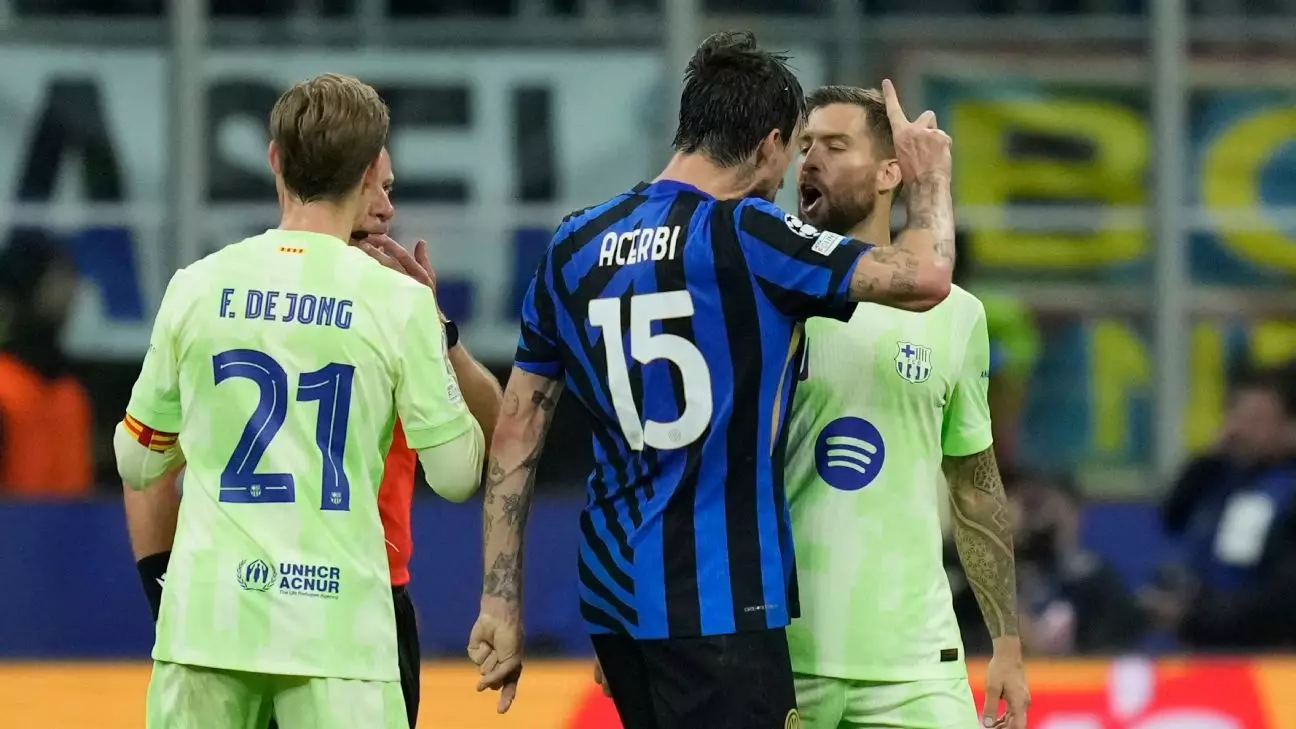In the world of football, rivalries often ignite fierce competitions, and the recent Champions League semifinal between Barcelona and Inter Milan was no exception. The match, which ended in a dramatic 4-3 victory for Inter after extra time, is now a talking point not just for the scoreline but for the incidents that unfolded during the game. Such intense rivals bring out a raw passion in players, fueling moments of high emotion that can lead to controversial situations on the field.
Spitting Allegations and Emotional Turbulence
A pivotal moment occurred after Inter’s second goal, when defender Iñigo Martínez found himself at the center of attention for allegedly spitting at opponent Francesco Acerbi. This incident escalated quickly, with Acerbi celebrating in close proximity to Martínez, a moment that was charged with emotion and frustration. Martínez later insisted that his actions were misinterpreted, claiming, “the spit was a metre away from him.” This detail is critical; it reflects not only the heated atmosphere of the match but also how easily miscommunication and heightened emotions can lead to accusations that spiral out of control.
Martínez’s assertion raises questions about the threshold of what constitutes acceptable behavior during intense competition. In high-stakes matches, emotions run high, and players sometimes react in ways that could be deemed less than sportsmanlike. However, distinguishing between genuine malice and an instinctual reaction in the heat of battle is crucial. It becomes a slippery slope when officials must navigate accusations amidst the game’s intense energy.
The Role of Officials and VAR in High-Pressure Moments
Referees and their decisions often play pivotal roles in matches, and their responses can either quell or escalate tensions. In this particular match, the referee opted not to take action against Martínez despite Acerbi’s complaint. Given the fervor surrounding the incident, the absence of VAR intervention is notable. It invites an ongoing discussion on the effectiveness of current technologies and protocols in addressing critical in-game scenarios, especially when allegations of misconduct arise. Did the officials dismiss a significant event, or were they simply caught in the whirlwind of the game’s emotional upsurge?
Moreover, the frustration expressed by Barcelona’s players post-match regarding the officiating highlights a broader concern within the sport. Queries into referee performance are not uncommon, and they underscore the immediate aftershocks that a contentious decision can create—constructing an atmosphere ripe for further disputes.
A Match That Will Be Remembered
As both teams geared up for the final whistle, the tension was palpable, leading to a nail-biting finish. Inter’s late equalizer by Acerbi, whose own journey in the match evolved from the victims of perceived foul play to heroes scoring critical goals, only added layers to the narrative. Their final goal ensured a climactic end to a game ripe with drama, skill, and controversy. Barcelona’s complaints afterward only illustrate how these incidents can linger in players’ and fans’ memories long after the final whistle—and how they shape the perception of justice in competitive sports.
Ultimately, this match galvanized both teams, with Inter set to face either PSG or Arsenal in the final, while Barcelona reflects on the razor-thin lines between rivalry and sportsmanship, teachings drawn from the flames of one unforgettable evening on the pitch. As football continues to evolve, so too will the discussions surrounding conduct, officiating, and the passionate spirit that makes the sport so riveting.

